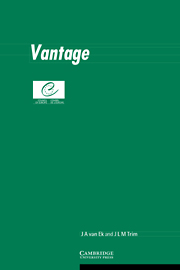Book contents
- Frontmatter
- Contents
- Introduction
- 1 The objective: levels of specificity
- 2 The objective: general characterisation
- 3 The objective: extended characterisation
- 4 The objective: components of the specification
- 5 Language functions
- 6 General notions
- 7 Topic-related tasks and lexicon
- 8 Discourse structure and verbal exchange
- 9 Dealing with texts: reading and listening
- 10 Writing
- 11 Sociocultural competence
- 12 Compensation strategies
- 13 Learning to learn
- 14 Degree of skill
- 15 By-products
- APPENDICES
14 - Degree of skill
Published online by Cambridge University Press: 28 January 2010
- Frontmatter
- Contents
- Introduction
- 1 The objective: levels of specificity
- 2 The objective: general characterisation
- 3 The objective: extended characterisation
- 4 The objective: components of the specification
- 5 Language functions
- 6 General notions
- 7 Topic-related tasks and lexicon
- 8 Discourse structure and verbal exchange
- 9 Dealing with texts: reading and listening
- 10 Writing
- 11 Sociocultural competence
- 12 Compensation strategies
- 13 Learning to learn
- 14 Degree of skill
- 15 By-products
- APPENDICES
Summary
Since, as we have remarked repeatedly in previous chapters, Vantage, as compared to Threshold, is marked by a relaxation of constraints, learners at Vantage level may be expected to communicate not only more effectively but also more efficiently and with greater ease in most of the communication situations in which they may find themselves. From one learner to another these situations, and their demands, may vary considerably, and they are even largely unpredictable. This means that at Vantage level learners should have a degree of communicative skill that enables them to cope with the unforeseen, and not just to cope but to do this without being unduly hindered by gaps in their ability to use the foreign language. This requirement may be defined under the headings of accuracy, appropriacy and fluency. These concepts are composite ones which can only be used with some measure of reliability in judging candidates if they are further specified and if a balanced weighting of their components is ensured.
Accuracy involves:
pronunciation (including rhythm and intonation);
spelling;
lexical, idiomatic and grammatical correctness.
At Vantage level learners may be expected – and will expect themselves – to score high on each of these points. Thus, their pronunciation will in no way interfere with being easily understood by native speakers of the foreign language as well as by non-native speakers with a communicative ability corresponding to or above that described in Threshold 1990.
- Type
- Chapter
- Information
- Vantage , pp. 115 - 117Publisher: Cambridge University PressPrint publication year: 2000



